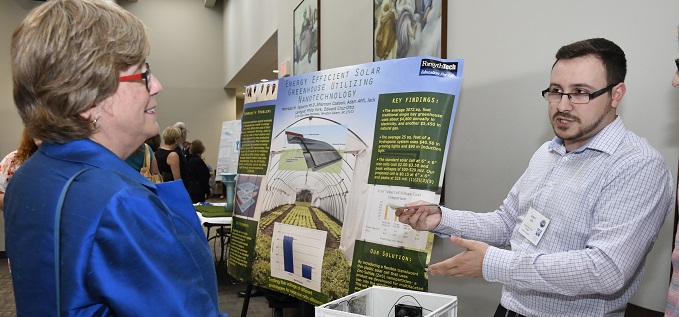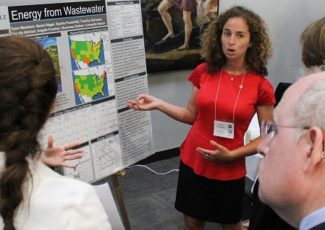When it all comes together
By Madeline Patton
November 30, 2016
Winners of the Community College Innovation Challenge explain how the competition has helped them become better students, speakers, entrepreneurs and more.
What a difference a year has made for Shannon Coalson and Adam Afifi.
Last autumn they and four classmates in the introductory nanotechnology course at Forsyth Community and Technical College (Forsyth Tech) were brainstorming ideas for the Community College Innovation Challenge (CCIC).
The team’s decision to build on Coalson’s research about solar thin films to develop a more energy efficient coverings for greenhouses was a good one: Their team won CCIC’s first prize in June. Participating in CCIC has transformed the students into poised speakers at a national conferences and events near Winston-Salem, North Carolina, where they explain the science behind their innovative concept and share their plans to continue working together after they wrap up their associate degree requirements.
They credit the discovery teaching approach of their nanotechnology instructor, Mehrdad Tajkarimi, and his tips for efficient reading of government reports and journal articles as critical to their success.
Coalson and Afifi think just their team’s selection as one of 10 finalists in the annual national competition sponsored by the National Science Foundation and the American Association of Community Colleges helped them obtain summer research internships at the Joint School of Nanoscience and Nanoengineering.
“It gave us better credentials, and, in that it creates more trust with us using their machines,” Afifi said.
The four-day Innovation boot camp with workshops by scientists and entrepreneurs that CCIC finalists participate in prior to the final judging boosted the students’ professional skills and confidence.
“It opened our minds about how to be better,” Coalson said. Each member of the Forsyth Tech team also received $1,500 for winning the competition.
On October 27, Afifi and Coalson talked about the CCIC during a panel presentation at the Advanced Technological Education Principal Investigators Conference in Washington, D.C. During the conference’s showcase they also exhibited the solar cell they designed.
In the coming months they will be deciding whether to seek a patent for their innovative concept, and whether the team will form a non-profit organization or a limited liability corporation.
After they graduate from Forsyth Tech in April with associate degrees in nanotechnology both Coalson and Afifi hope to continue to do research as part of their bachelor’s degrees.
Open for entries
This year’s CCIC gives students the choice of three themes for their projects: maker to manufacturer, energy and environment, or security technologies. Community college student teams’ innovative solutions to real-world problems that encompass one of these themes must be submitted by February 15.
Entry requirements include a 90-second video and a written description of the innovation, the problem that it addresses, its benefits and impacts, and the role of an industry or community partner in the innovation.
Teams may have three to five students, and must have a faculty mentor and community or industry partner. Student members of the team awarded first prize each receive $1,500. The second place prize is $1,200 for each student team member.
You can read this article in full at Community College Daily.
Continue the conversation on LinkedIn.




